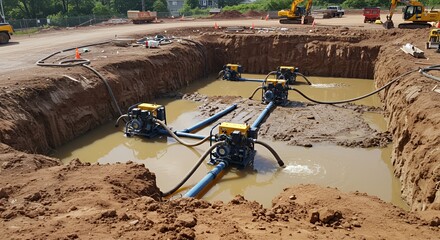
Water is essential for life, and in many situations, a reliable water pump plays a critical role in moving, storing, and supplying it. Whether for homes, farms, businesses, or construction projects, water pumps ensure a steady flow and distribution where it is needed most. Knowing how water pumps work, the different types available, and their benefits can help you choose the right system while keeping operations smooth and efficient.
What is a Water Pump
A water pump is a device designed to move water from one location to another. It works by creating pressure that forces water through pipes, hoses, or systems. These pumps are used in many settings, from supplying household water to powering irrigation systems, supporting construction projects, draining flooded areas, or even circulating water in heating and cooling systems.
The versatility of water pumps makes them a vital tool in everyday life. Without them, many industries and households would struggle to maintain an efficient water supply and management.
Different Types of Water Pumps
Water pumps come in various types, each designed for specific applications. Understanding these categories helps in making the right selection for your needs.
- Centrifugal Pumps – One of the most common, centrifugal pumps use rotational energy to move water. They are efficient and suitable for large-scale water transfer.
- Submersible Pumps – These pumps are placed underwater, often in wells or flooded areas. They push water to the surface and are ideal for deep-water applications.
- Jet Pumps – Typically used for wells, jet pumps create suction to draw water from underground sources.
- Booster Pumps – Designed to increase water pressure, booster pumps ensure strong and consistent flow in residential or commercial systems.
- Transfer Pumps – Portable and versatile, these pumps are great for moving water quickly from one place to another.
Each type has its advantages, and the choice depends on the task at hand, the volume of water needed, and the environment where it will be used.
Common Uses of Water Pumps
The uses of water pumps extend across many areas of life and industry. Some of the most common applications include:
- Home Water Supply – Pumps draw water from wells or storage tanks to provide consistent household water.
- Agriculture and Irrigation – Water pumps supply fields, crops, and livestock with the necessary water for growth and survival.
- Construction Projects – Pumps remove excess water from building sites, keeping foundations dry and work areas safe.
- Flood Control – Pumps are used to drain basements, roads, and fields after heavy rainfall or flooding.
- HVAC Systems – Heating and cooling systems rely on pumps to circulate water for temperature regulation.
- Industrial Processes – Many industries use pumps to move water for production, cooling, or cleaning purposes.
This wide range of uses makes the water pump one of the most versatile tools in modern infrastructure.
The Importance of Water Pump Efficiency
Efficiency is a key factor when it comes to water pumps. A properly sized and well-maintained pump ensures water is moved effectively while saving energy and reducing costs. Inefficient pumps can waste electricity, struggle to maintain consistent pressure, or wear out quickly.
Regular maintenance, proper installation, and choosing the right pump for the job are all essential in maximizing performance. An efficient pump not only saves money but also extends its service life, providing long-term value.
Benefits of Using a Water Pump
Investing in a water pump offers numerous advantages for both households and businesses. Some of the main benefits include:
- Reliable Water Supply – Ensures consistent access to water in areas with limited natural flow.
- Increased Water Pressure – Helps in maintaining steady pressure for showers, faucets, and irrigation systems.
- Time and Labor Savings – Automates water movement, reducing the need for manual effort.
- Versatility – Adapts to various applications from residential use to industrial settings.
- Emergency Use – Effective in dealing with floods or draining unwanted water quickly.
These benefits highlight why water pumps are considered indispensable tools across different sectors.
Tips for Choosing the Right Water Pump
Selecting the correct water pump depends on understanding your specific needs. Here are some important tips to consider:
- Determine Water Source – Is it from a well, a tank, or surface water? This helps decide between submersible, jet, or centrifugal pumps.
- Calculate Water Volume – Knowing how much water needs to be moved ensures you choose the right pump size and capacity.
- Consider Pressure Requirements – For households and irrigation, water pressure is just as important as volume.
- Check Power Options – Pumps can be powered by electricity, fuel, or even solar, depending on availability.
- Think About Portability – If you need to move water in different locations, a lightweight transfer pump may be best.
By considering these factors, you can select a water pump that offers reliability, efficiency, and long-lasting service.
Maintaining Your Water Pump
Like any piece of equipment, water pumps require regular care to perform their best. Some simple maintenance steps include:
- Inspecting for leaks, unusual noises, or reduced pressure.
- Cleaning filters and removing debris that may block water flow.
- Checking seals, valves, and connections for wear and tear.
- Lubricating moving parts if required.
- Scheduling routine professional inspections for long-term reliability.
With proper maintenance, a water pump can last for years and continue to deliver consistent performance.
A water pump is more than just a machine—it is a vital tool that supports daily living, agriculture, construction, and industry. From providing clean water at home to ensuring crops are irrigated and buildings remain dry, water pumps play a crucial role in maintaining efficiency and safety.
By understanding how they work, recognizing the different types, and practicing regular maintenance, anyone can make the most of this essential piece of equipment. Reliable, efficient, and versatile, the water pump remains a cornerstone of modern water management and a valuable investment for both households and businesses.